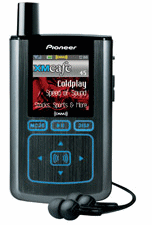XM Radio’s newest gadget is illegal and should be pulled from the market,
according to a lawsuit filed Tuesday by the Recording Industry Association of America (RIAA).
The RIAA claims XM’s compulsory
license gives satellite radio companies only the right to publicly perform
copyrighted works in a non-interactive, radio-like service.
The RIAA is seeking $150,000 in damages for every song recorded to XM’s new device.
The Inno device, which is manufactured by Pioneer, allows subscribers to record
up to 50 hours (approximately 1,000 tunes) of XM content for playback solely
on the Inno device.
Music stored on the Inno can’t be moved to other devices
or uploaded to the Internet.
The Inno also allows XM subscribers to store MP3 files and bookmark XM
content for later purchase through Napster.
 |
The Inno is RIAA’s latest bugbear. Source: Pioneer |
“XM is playing a legal shell game by trying to morph a broadcast service
into an ownership device,” the RIAA said in a statement. “They are
attempting to compete with an iTunes or Rhapsody model while bypassing the
compensation made by those and other services to the music community.”
The Washington, D.C.-based XM vowed to “vigorously” defend itself against
the charges.
“These are legal devices that allow consumers to listen to and record radio
just as the law has allowed for decades,” XM said in the battle of dueling
statements.
“The music labels are trying to stifle innovation, limit
consumer choice and roll back consumers’ rights to record content for their
personal use.”
XM claims the lawsuit is a negotiating tactic by the RIAA in XM’s current
contract talks with the music industry over licenses and fees. New
York-based Sirius, the country’s only other satellite radio service, has
negotiated a deal with the RIAA and is not subject to the legal action.
“The service transforms XM’s satellite transmission from a radio broadcast
into a digital download service that provides subscribers with permanent
copies of individual songs,” the RIAA lawsuit states.
“More egregiously, the service allows subscribers to save
downloaded files directly from digital play lists provided by XM — without
ever having to listen to XM’s actual satellite radio programming.”
To bolster its case that XM is attempting to offer a download service
without paying royalties to copyright owners, the RIAA points to XM’s
advertising for the Inno, which states, “It’s not a pod, it’s the
mothership.”
The RIAA is also looking to Congress for help in its campaign against XM’s
new service.
In the Senate, Diane Feinstein (D-Calif.) has introduced the PERFORM Act
(Platform Equality and Remedies for Rights Holders in Music) of 2006,
with comparable legislation backed in the House by Howard Berman (D-Calif.)
and Mary Bono (R-Calif.).
The PERFORM Act would force the use of protected formats for all streaming
media services, whether online, on cable or through satellite radio and TV.
Several weeks ago, Universal Music attorney Michael Ostroff told a House
panel, “Congress gave the satellite services a compulsory license to perform
our music, so that their subscribers could listen to it,” Ostroff said.
He added that the music industry helped launch satellite radio service by
agreeing — through the compulsory license — to sell below market rates for XM music.
“Now XM wants to stretch and reinterpret the government-imposed license into
a service that enables their subscribers to make permanent copies of our
music,” Ostroff said.


